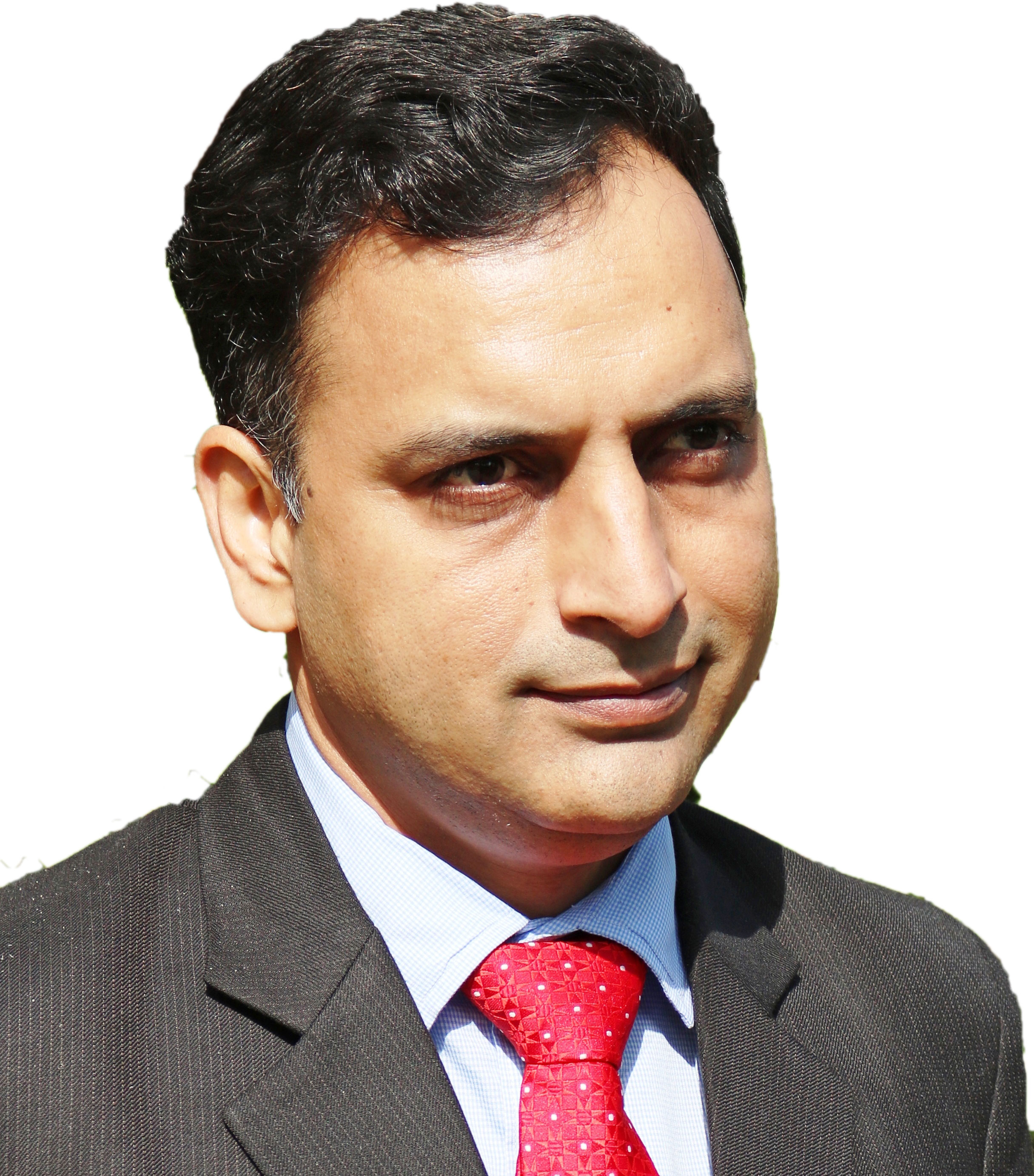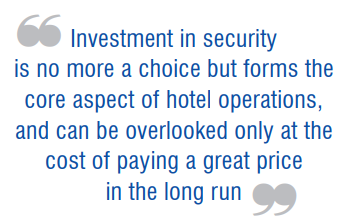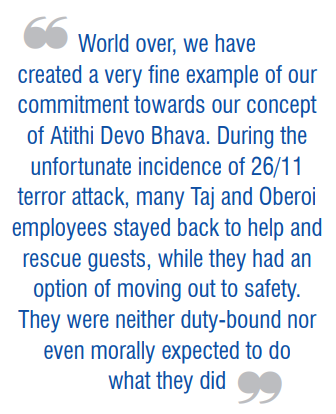
Priyadarshan Lakhawat
Deputy Director (Academics & Training)
NCHMCT, Ministry of Tourism, Govt. of India
The rising instances of fire in high-rises and hotels, and very frequent news of defunct security systems at places including in the cities like New Delhi put forth reasons to be concerned about the state of compliance of pertinent rules and regulations, and installation and maintenance of the needed equipment. The recent fire in a hotel in Karol Bagh, New Delhi must be taken as an wake-up call to address the issue on urgent basis.
The lapses are prominently found at both ends – the system and service providers as well as the service takers. Besides, while at one end there are lapses in the hands of government authorities including the licensing ones, consumers are also not aware and alert towards their duties and entitlements. They appear to take security as granted and consider it of the least value in affairs of life. India necessarily needs to evolve a culture of security and safety.
To understand the subject in detail and spot the points of lapses and improvements, SecurityLink India has recently spoken to Priyadarshan Lakhawat, Deputy Director – Academics & Training, National Council for Hotel Management & Catering Technology, Ministry of Tourism, Govt. of India. Mr. Lakhawat is the winner of two national awards for excellence in hospitality education – Best Teacher for the Years 2012-13 & 2013-14, and Indian Hospitality Congress – Educator’s Award 2015.
SecurityLink India (SLI): How do you see Security & Safety in terms of necessity vs. business?
Priyadarshan Lakhawat: Derek Bok, President of Harvard University, once remarked, “If you think education is expensive, try ignorance.” Same principle is applicable for the hotel security systems as well. Of course, security comes with a cost for the business but in comparison the price to be paid for its absence is humongous – particularly, in today’s environment when security risks in hospitality industry are varied and manifold. A guest is concerned about the security aspects in his immediate environment and it’s one of the important concerns for him in making a purchase decision. Investment in security is no more a choice but forms the core aspect of hotel operations, and can be overlooked only at the cost of paying a great price in the long run.
SLI: Kindly mention some major threats of hospitality industry in the world’s perspective?
Priyadarshan Lakhawat: Hospitality industry is highly vulnerable to security threats. Hotels are public places with lots of porosity. There is this constant conflict between maintaining the privacy and pleasant experience of guest while at the same time implementing the laid-out security procedures. If we look at the major security threats they come in the form of fire, cyber-threats, natural calamities, theft, assault, bomb threats, terrorism and physical brawls. However, this list is just indicative. As a matter of fact, any threat which we may perceive at any place is very well applicable inside a hotel as well.

SLI: And what are the threats in India?
Priyadarshan Lakhawat: Threats in hospitality industry in India are similar to any other part of the world. Infact, hospitality industry is more global in its character than most other sectors. So, issues and concerns are almost similar everywhere. However, in India an additional problem is with regard to implementation of regulation. Laws and regulations governing hotel industry in India are as potent as in any other part of the world. Unfortunately, the same cannot be said about the implementation of law. Particularly in semi-organised and unorganized sector many a times we find a blatant disregard for procedures. Responsibility lies with both, the business as well as the law enforcement agencies. Look at the recent fire tragedy in a Karol Bagh hotel in the heart of national capital. Do we need a wake-up call in the form of a loss of 17 precious lives? According to newspaper reports, all rules related to fire safety have been overlooked in this hotel and still they were able to operate. It’s a dangerous situation and does not augment well for the brand Incredible India. Effective deterrence mechanism is required for this kind of criminal negligence and connivance.
SLI: Which of these do you rank as the top threats both for India and the world?
Priyadarshan Lakhawat: I will put cyber crime and identity thefts at the top of the pyramid. Guest data is highly vulnerable as there are several points in a hotel where data is taken and recorded such as reservation, check-in, restaurant, any point-of-sale etc. There are also some external intermediaries who are involved in the process and chances of leakage are always there. Look at the case of Marriott International. In last 5 years, since Marriott took over Starwood, data of 500 million users is feared to have been compromised which includes not only the financial details but also the passport information. Marriott share has come down by 5.6% as per reports.
While it is a case in public domain, I do not single out Marriott. This is happening everywhere and this may happen anywhere. There is an immediate need for hotels to get help of specialized agencies to counter this menace. Effective checks are required at all levels. I always say that the abuse of technology can only be countered through the use of technology. We cannot develop an ostrich mentality and bury our heads in the sand while the predators are lurking all around us and are impacting our business.
Ransomware has attacked several central servers and has blocked not only hotel software but also in some cases the lock and key systems of hotel rooms resulting in not only huge inconvenience for guests but also great financial losses to hotels. All this points out to a pre-emptive approach and checks in place.
Ransomware has attacked several central servers and has blocked not only hotel software but also in some cases the lock and key systems of hotel rooms resulting in not only huge inconvenience for guests but also great financial losses to hotels. All this points out to a pre-emptive approach and checks in place.
SLI: What is your take on the legal provisions in relation to the security and safety of hospitality industry in India and how competent do you find them?
Priyadarshan Lakhawat: As I said the law related to setting-up and running a hotel in India is potent and well thought of. It starts from having a building permit. Ideally, the layout should be approved before hand with provisions for fire safety, water supply, drainage, sewerage, electrification, parking etc. Additionally, there are norms related to fire safety permit, police license, health license, ESI, PF, FSSAI, VAT etc. While, these licenses are well meaning and should serve as a good check and balance system in the running of business, many a times they are windows for corrupt practices thereby not fulfilling the purpose for which they exist and also creating an uneven playing field for those operators who want to work lawfully and ethically.
SLI: Security being the basic requisite for the hotel business, should be the responsibility of all. How far the members of staff other than security staff are made to aid and complement it?
Priyadarshan Lakhawat: In a hotel, all employees are a part of the security team – only this kind of approach can create a near fool-proof security environment. While security staff is specialized to handle technology and also to carry out safety and security procedures, they cannot be fairly expected to be omnipresent – particularly in an hour of crisis. As an example, at a time of evacuation or while reporting any suspicious activity, each and every employee of the hotel has a very important role to play.

SLI: How do you look at Indian hotel employees in this context?
Priyadarshan Lakhawat: Hospitality is a part of our ethos and culture. It comes naturally to us. Therefore, I rate hotel employees in India on a very high scale when it comes to delivering safety and security for their guests. In fact, we have a very proud example of Taj and Oberoi employees during the unfortunate incidence of 26/11 terror attack. Many hotel employees stayed back and were put to help and rescue guests, while they had an option of moving out to safety, as well as they were neither duty bound nor even morally expected to do what they did. World over, we have created a very fine example of our commitment towards our concept of Atithi Devo Bhava. While this is a very good example of the right mindset of hotel employees in India, the competencies are definitely required to be developed through constant training.
SLI: What is the significance of training in this context?
Priyadarshan Lakhawat: There is an age old adage in army – more you sweat in training, less you bleed in battle. This is an apt statement for most walks of life. In hotels, two areas – in particular fire safety and first aid – are the responsibility of each and every employee and specialized training on a regular basis should be mandatory part of the training calendar of all hotels. Training should start at the level of hospitality training institutes and then should be a part of career long reinforcement sessions.
SLI: You are looking after academics and training at NCHMCT. Kindly explain the role the training institutes can play towards accomplishing a threat free hotel business in India?
Priyadarshan Lakhawat: I work for National Council for Hotel Management and Catering Technology which is an apex body under Ministry of Tourism in the field of hospitality education and training. We have about 80 affiliate institutes in the country where a standard curriculum is being followed. These institutes are the major feeder source of manpower in the organized hospitality sector in country. The NCHMCT curriculum puts a lot of focus on safety and security with fire safety, first aid, bomb threats, theft, situation handling being a part of our training programs. However, a major part of work force in India, particularly in hotels other than 3 star to 5 star is without any formal qualification in this trade. That puts a lot of onus on hotel managements and also on regulatory mechanism to mandate regular trainings and drills. Similarly, reinforcement training programs and fire safety/ evacuation drills should be conducted atleast twice a year for all employees at all levels.
SLI: There are usual security lapses at the end of people/ consumers in India who generally take security as granted and keep it at the back seat. What is your take on the safety and security culture in India?
Priyadarshan Lakhawat: Safety and security can’t be just a part of procedure. I mean it should not be just a mechanized affair. It has to be a part of the organizational culture where each and every employee considers it to be his or her responsibility. The Bali night club bombings, Las Vegas Shooting, Paris café attack – each of them has indicated that danger lurks far closer than what we thought it to be. The watershed moment in India’s hospitality sector remains 26/11.
Terrorism in India’s hospitality sector is not the number one threat. It may not be among top five threats as well. However, in terms of mindset paradigm, it had the same effect for India’s hotels as probably 9/11 had for airport security in USA. Before 26/11, hotel employees in India looked at security systems as an unavoidable occupational hazard. Security and hospitality were considered antithesis of each other rather than having a symbiotic relationship. Those few hours of mayhem came as a black swan moment and changed the way hotel security will be perceived forever.
SLI: What lapses in terms of security and safety do you find in India?
Priyadarshan Lakhawat: Today, safety and security apparatus and system is part of star classification norms in India. Security is not limited to just guarding entrances but it includes a wide gambit of tools and techniques. At the risk of sounding a naysayer, my concerns to security environment in Indian hotels are still there and most of them are not misplaced. First of all, security systems can’t be for regulatory compliance only. They must be well meaning in spirit. For instance, CCTVs work as eyes and ears of a security system. They cover not only peripheries but also public areas and corridors. However, you will often find that many CCTV are just ornamental in their utility. They are defunct. The quality of camera is also suspect in terms of resolution and night vision. Chinese products at a low cost and lower efficiency are preferred gadgets instead of the better ones with operational efficiency. Fire extinguishers, if fortunate to be there, are expired lots. Problem as I said earlier is more acute in smaller category of hotels. This is on account of lack of awareness, lack of intent and lack of training. We just wait for a mishap to happen.
SLI: How do you view the state of employee safety in the hotel industry in India?
Priyadarshan Lakhawat: Safe employees are as much a part of hotel safety systems as safe guests. Recent incidence of a brawl in a Janakpuri hotel in which guests resorted to mob violence against staff as they did not like the buffet food is one such case in recent past. However, the problem is far more prevalent than what is seen on the surface. In hinterland India it is a part of everyday existence of a hotel employee. The condition of female employees is far worse with them being viewed as commodities rather than as professionals providing a service. Unfortunately, in some cases, even some of the most reputed hotel chains have not stood up and taken a stand for a female employee in case of misbehaviour by a guest. Only in a safe environment, an employee will be able to deliver at his best. Operational workplace hazards such as lifting of heavy weights (particularly in kitchen and housekeeping), long shift hours, lack of work-life balance etc. take a heavy toll on efficiency and morale of staff. This certainly is also an issue to be taken up with equal amount of seriousness and to be addressed along with other safety and security issues to attain a holistic safe environment.
SLI: What are your recommendations towards safety and security of hospitality industry?
Priyadarshan Lakhawat: Let me put my recommendations in the listed format:
- Well laid-out crisis management plan for different emergency situations.
- Proper training of security staff.
- Training of all hotel employees for fire safety, first aid and evacuation drills.
- Regular operational check on fire alarms, smoke detectors, CCTV/ security cameras, emergency power etc.
- Police verification of each and every hotel employee.
- Extra security measures for women guests like mirrored walls of guest corridors, separate eva floors, assigning rooms closer to elevators, presence of security on each floor.
- Well lit public areas – especially parking and other vulnerable places.
- Creating awareness among guests without actually scaring them off. Inform them about not leaving their rooms open, fire exit plans, not to announce their room numbers loudly in public places, do’s and don’t for their own safety, and so on.
- Use of anti-virus, anti-ransomware, anti-data theft programs as part of cyber security.
- Comprehensive security audits through external specialized agencies.